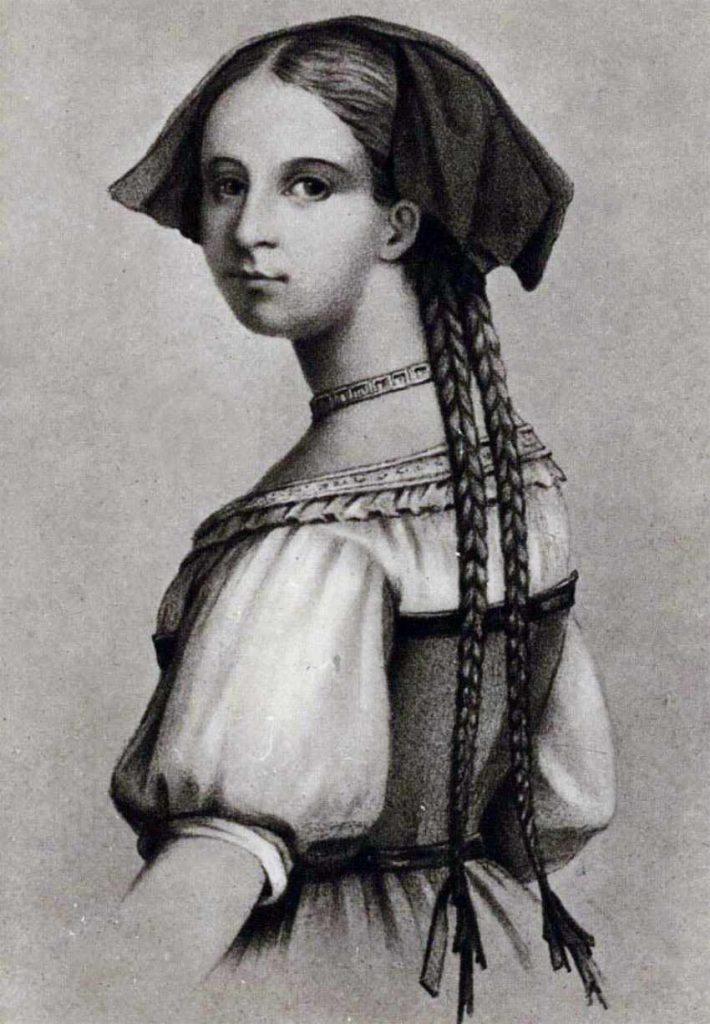
Friederike Elisabeth Brion (born, probably on April 19, 1752 in Niederrödern in Alsace; died on April 3, 1813 in Meißenheim) was an Alsatian pastor’s daughter. She had a short but very important love affair with the young Goethe. Friederike spent her childhood in the rectory of Sessenheim, where her father had a job as a village pastor.
Among the young people who occasionally visited the hospitable rectory was the Strasbourg law student Johann Wolfgang Goethe from Frankfurt. In the autumn of 1770, while roaming around Strasbourg, he came to the small village of Sessenheim 40 kilometers northeast of Strasbourg for the first time. This excursion was to result in one of the most famous love episodes in literary history.
Goethe later reported on his first meeting with Friederike: “At that moment she really stepped in the door; and then a very dearest star rose in this rural sky.” And further: “Slender and light, as if she had nothing to wear, she strode, and the neck almost seemed too delicate for the huge blond braids of the cute little head. With cheerful blue eyes she looked around very clearly, and that nice Blunt nose explored the air as freely as if there could be no worry in the world; the straw hat hung on my arm, and so I had the pleasure of seeing and recognizing her at first glance in all her grace and loveliness. “
Over the next few months, Goethe made many great rides to Sessenheim, which were followed by extended stays in Haus Brion. For the next year, the small town became the “center of the earth” for Goethe.
Through this limitless happiness “the desire to direct” suddenly emerged, which Goethe “had not felt for a long time”. In the spring of 1771 a number of poems and songs were written, which were sometimes sent to the beloved with “painted ribbons”; the “Sesenheimer Lieder” are largely part of the “Sturm und Drang” and established Goethe’s reputation as a poet. Among them are for example the “Mailied”, “Willkommen und Abschied” and “Das Heidenröslein”.
The love affair, however, did not last long. Already in the early summer of 1771, Goethe, who compared his restless soul to the “weather cock over there on the church tower”, thought of ending the relationship. On August 7th, 1771 he saw Friederike for the last time before he returned to Frankfurt: “When I reached her hand from the horse, tears stood in her eyes and I felt very tired.” It was only from Frankfurt that he wrote a letter to Friederike that finally resolved the relationship. Friederike’s answer “tore my heart apart (…); I always felt that I missed it, and worst of all, I couldn’t forgive myself for my own misfortune (…). Here I was guilty for the first time; – but the farewell was final. Friederike Brion remained unmarried until the end of her life and lived in her parents’ house until her father’s death in 1787. Her mother had died a year earlier. After her father’s death, Friederike and her younger sister Sofie moved to live with her brother Christian in the parish of Rothau im Steintal. The two stayed there even after his transfer.
In 1801 Friederike moved to the rectory in Diersburg to support her ailing sister. Friederike followed the von Diersburg family to the rectory in Meißenheim in 1805. In 1807 the sister died. Friederike stay with her brother-in-law. She wasn’t in the best of health either. At the beginning of 1813 she had to ask her sister Sofie to take care of her. She died on April 3rd, 1813 and was buried on April 5th in the Meißenheim church cemetery. The inscription on the tombstone that can be seen there today reads:
“A ray of the poet’s sun fell on her, so rich that it gave her immortality!”
Logically, Meißenheim has a special cultural highlight to offer in 2013. The 200th anniversary of the death of the famous citizen of the community, Friederike Brion, is on April 3rd, 2013.
In order to be able to celebrate this event properly, we invite everyone interested in the community and in “Friederike Brion” to determine and plan the manner, the course and the scope of the celebrations together.
Interest? Then come to the meeting room of the town hall in Meißenheim on Tuesday, September 18, 2012 at 7:00 p.m.
We look forward to your support.
You, Mayor Alexander Schröder